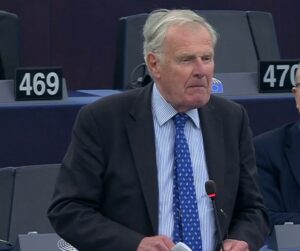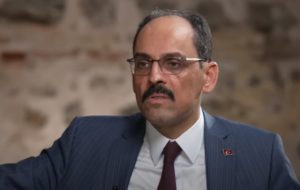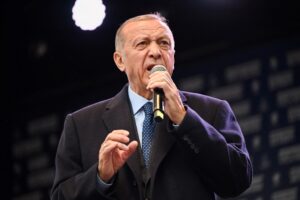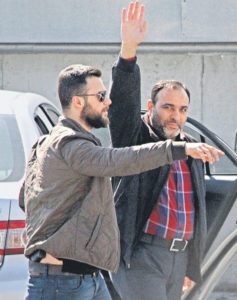Abdullah Bozkurt/Stockholm
Europe’s leading intergovernmental body, which advocates the rule of law, fundamental rights and democracy, slammed Turkey’s notorious intelligence agency MIT for its clandestine operations abroad to intimidate critics, opponents and dissidents.
The report, drafted by British lawmaker Christopher Chope for the Parliamentary Assembly of the Council of Europe (PACE), highlighted the role of MIT in abducting critics from other countries in a clear violation of international and national laws.
“In September 2022, a businessman named Ugur Demirok was reported to have been abducted in Baku by the Turkish intelligence agency (MIT) and rendered to Türkiye,” the report said, adding that Turkish officials openly claimed credit for such operations on foreign soil and praised the role of MIT.
Demirok is believed to be affiliated with the Gülen movement, a group critical of the government of President Recep Tayyip Erdogan over pervasive corruption in the administration and Turkey’s aiding and abetting of armed jihadist groups. The movement has borne the brunt of the government crackdown on opposition groups in the last decade, with some 2 million perceived members being the subject of bogus criminal investigations.
The report, the first among CoE bodies to address transnational repression and discuss legal standards for such practices, states that “transnational repression is a global phenomenon attacking the foundations of democratic societies and the rule of law, and that strengthened and more coordinated action to prevent and fight it is needed.”
PACE draft report on transnational repression highlighted the role of Turkey in the abduction of opponents abroad:
PACE called on states that have reportedly engaged in transnational repression to ensure that those responsible are brought to justice and that victims receive reparations. In order to better prevent and fight transnational repression, it recommended that all states develop legal guidance for government agencies, impose targeted sanctions and expel diplomats who have been directly involved in transnational repression incidents.
In fact, Switzerland, a member of the CoE, was one of the countries in Europe that did exactly as recommended by the report when Swiss authorities investigated the kidnapping attempt of a critic by MIT. Two Turkish diplomats, then-Press Attaché Hacı Mehmet Gani and Hakan Kamil Yerge, then-second secretary at the Turkish Embassy in Bern, both believed to be undercover MIT agents, plotted to drug and kidnap a Swiss-Turkish businessman in 2016.
In June 2018 the Office of the Attorney General of Switzerland issued arrest warrants for the two Turkish diplomats and confirmed that they would be arrested upon their entry into Switzerland. According to local reports, criminal proceedings against the two diplomats were launched in March 2017. Yerge left Switzerland in November 2016, whereas Gani remained until August 2017.
The Turkish diplomats were accused specifically of having gathered political intelligence for another state and of having attempted to kidnap a Swiss businessman with Turkish roots. The businessman was reportedly affiliated with the Gülen group and had been living in Switzerland for some 30 years.
Turkey uses various means to ensure critics are forcibly returned to Turkey as part of the Erdogan government’s intimidation campaign. The Erdogan government even plotted to abduct Fethullah Gülen, a Turkish cleric resident in the US who inspired the movement, from US soil, as The Wall Street Journal reported in November 2017.

According to the PACE report, the Turkish government’s tactics rely on “renditions, abuse of extradition proceedings, Interpol Red Notices, anti-terror financing measures, and co-opting other States to deport or transfer persons unlawfully.” It noted that the Turkish government has a consistent policy of hunting down anyone related to the Gülen movement.
“On 6 September 2018, the Republic of Moldova transferred seven teachers of Turkish nationality, circumventing domestic and international law. Kosovo was co-opted to illegally deport six Turkish teachers to Türkiye on 29 March 2018. In both cases, there were accusations that the Turkish Government received high-level political support for these operations, but only the heads and officials of the intelligence agencies were blamed,” the report said. The teachers were working for Gülen movement-affiliated schools.
Since 2016 the Erdogan government has resorted extralegal methods to secure the return of its critics after its official extradition requests are denied.
The PACE report follows similar concerns about such methods expressed by UN human rights bodies. In a joint letter UN rapporteurs accused the Turkish government of engaging in the systematic practice of state-sponsored extraterritorial abductions and forcible returns to Turkey, with at least 100 Turkish nationals renditioned from multiple states to Turkey.

In several of these abduction cases the UN Working Group on Arbitrary Detention (WGAD) concluded that the arrests, detentions and forced transfers to Turkey of Turkish nationals were arbitrary and in violation of international human rights norms and standards.
Unlike other notorious countries such as Russia and Iran, which publicly deny pursuing a policy of transitional repression, the Erdogan government openly boasts about implementing this policy and brags about how they manage to kidnap and bring critics from foreign soil to Turkey, often with the help of the intelligence service. In its annual report, MIT officially confirmed that it had conducted operations for the forcible return of more than 100 people with alleged links to the Gülen movement.
“… [M]ore than 100 members of the [Gülen movement] from different countries were brought to Turkey as a result of the [agency’s] increased operational capacity abroad,” MIT’s 2022 report said.
The undated 16-page report, written some time in March 2023, further admitted to having targeted journalists and media professionals abroad. It wrote that in the year 2022 “[t]he work on deciphering the black propaganda attempts aimed at undermining our country has continued without interruption.” “Black propaganda” is a reference to coverage critical of Turkey by journalists who were forced to go into exile and pursue their careers abroad after the Erdogan government started arresting journalists by the hundreds, wiping out nearly the entire critical, independent and opposition media in Turkey over the last decade.
In other words, as it tried to defend its record, MIT acknowledged the policy of targeting and harassing Turkish journalists who live in Europe and North America, where MIT agents run illegal surveillance operations.

MIT’s spying on journalists in Europe was exposed last year when the agency leaked surveillance photos and the residential addresses of journalists who live in Germany and Sweden as part of the Erdogan government’s intimidation campaign.
The PACE report also made reference to the practice and used the case of Turkish journalist Bülent Keneş as an example. “A pro-government newspaper had revealed Mr Keneş’s home address and published secretly taken photos in November 2022,” it said, recalling a report by the Sabah daily, a newspaper owned and operated by the Erdogan family. The surveillance photos and private information about Keneş and other exiled journalists in Europe were believed to have been collected by the intelligence agency.
The report lambasted President Erdogan for singling out Keneş’s extradition as a condition for Turkey’s approval of Sweden joining NATO after the Swedish Supreme Court rejected the Turkish government’s extradition request. “This behaviour is unacceptable to all those who support the rule of law and serves as an example of the type of pressure which some countries seek to exercise over others to pursue what is essentially another aspect of transnational repression,” the report said.
PACE pointed out that NGOs have also highlighted the role of the Turkish intelligence agency in the threatening and intimidation of Turkish opposition members and journalists in exile and called on member states to avoid any cooperation with the Turkish intelligence agency.

Erdogan and his intelligence service have been viciously targeting critical journalists and dissident groups such as the Gülen movement since the corruption investigations of December 17-25, 2013, which incriminated then-prime minister Erdogan, his family members and his inner circle. The Erdogan government often invokes abusive counterterrorism laws to punish journalists, critics and human rights defenders with no evidence to support the serious charges leveled against them.
Turkey’s efforts at transnational repression of critics abroad do not seem to be winding down. Most recently, Mehmet Cintosun, who went missing in Erbil, Iraq, on January 29, turned out to be in police custody in Turkey when photos of him were made public by MIT on April 14.












